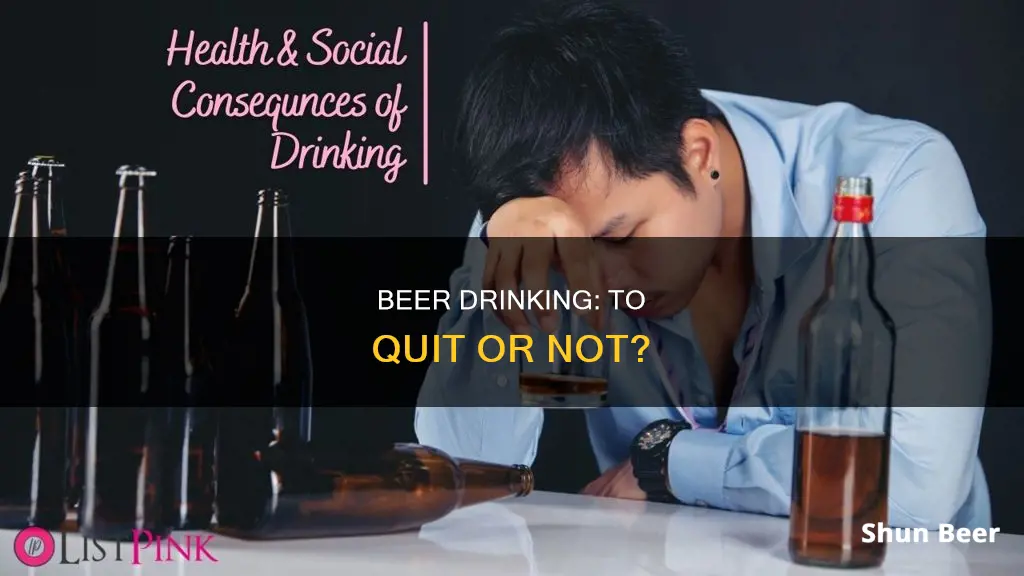
Drinking beer is a common social activity, but it can be difficult to know when it has become a problem. Deciding to quit drinking is a personal journey, and it can be challenging to recognise when your drinking is out of control. If you are dependent on alcohol, it is important to stop drinking completely and seek professional help. For others, cutting back may be beneficial, and there are many strategies to help with this. Understanding your relationship with alcohol and recognising the reasons why you want to quit or cut back is an important first step. This might include improved physical health, mental clarity, stronger relationships, or increased productivity.
What You'll Learn

You'll sleep better
Alcohol disrupts your sleep. While it may help you fall asleep faster and deeper at first, it negatively affects your sleep quality after that initial period of rest. You might toss and turn, and the sleep you get is unlikely to leave you feeling refreshed and sharp the next day.
Alcohol increases alpha wave patterns in the brain, a type of brain activity that usually occurs when you're awake but resting. This results in disrupted sleep. It also interferes with the important REM stage of sleep and may cause you to wake up repeatedly throughout the night.
Quitting alcohol will likely improve your sleep quality, leaving you feeling more rested and energised in the morning. This, in turn, can lead to improved mood, concentration, and mental performance.
A study by researchers from the University of Sussex in the UK found that people who gave up alcohol for a month reported higher energy levels and better overall health. They also experienced improved sleep quality, with 71% of participants stating they enjoyed better sleep.
Additionally, 70% of participants in the study reported better overall health, and 67% reported higher energy levels. So, by quitting drinking, you'll not only sleep better but also experience other health benefits that will improve your overall quality of life.
Beer Drinkers and Alcoholism: Understanding the Risks
You may want to see also

Your skin will improve
Quitting beer and other alcoholic drinks can have a positive impact on your skin's appearance and health. Alcohol is a diuretic, which means it increases the rate at which your body gets rid of water, leading to dehydration. This dehydration caused by alcohol consumption can result in dry skin that appears dull, ashy, and lacking lustre.
Within a few days of cutting out alcohol, you may notice that your skin looks and feels more hydrated. This is because, by quitting drinking, you're no longer inhibiting your body's ability to retain water effectively.
In addition, alcohol decreases the production of vasopressin, an antidiuretic hormone that helps the body reabsorb water. By reducing alcohol intake, your body will be able to produce more vasopressin, further improving your skin's hydration levels.
The improvements in skin hydration can also lead to a reduction in skin ruddiness, particularly in the cheeks and around the nose. Other skin conditions, such as dandruff, eczema, or rosacea, may also show signs of improvement.
The positive effects on your skin don't stop at hydration. Alcohol consumption can also impact your skin's overall health and appearance by affecting your sleep quality. Drinking alcohol can disrupt your sleep, leading to fatigue and a dull complexion. By quitting drinking, you'll likely experience improved sleep quality, resulting in a more well-rested and rejuvenated appearance.
The impact of quitting drinking on your skin goes beyond the immediate physical changes. It's also about what you're not putting into your body. Alcohol is often packed with empty calories and sugar, which can contribute to weight gain and skin issues. By cutting out these additional calories and sugar, you're reducing the likelihood of weight-related skin concerns, such as enlarged pores and acne.
Additionally, the money saved from not purchasing alcoholic drinks can be redirected towards investing in quality skincare products and treatments. This can further enhance the health and appearance of your skin.
Making the decision to quit drinking beer and other alcoholic beverages can be a challenging but rewarding choice. The positive impact on your skin's health and appearance is just one of the many benefits you may experience on your journey towards a healthier and more vibrant you.
Exploring the Legal Drinking Age: Beer at 18?
You may want to see also

You'll lose weight
Fewer Empty Calories
A glass of beer contains about 150 calories, and these are mostly empty calories from sugar. Just one beer may contain 300 calories or more. Men, for instance, consume an extra 433 calories on days they drink a "moderate" amount of alcohol. Cut those from your diet, and you'll start to see the pounds drop off without much effort.
Less Overeating
Alcohol increases your appetite. It also makes you more impulsive and less able to resist snacks and other temptations. According to a study published in the American Journal of Clinical Nutrition, alcohol is one of the biggest drivers of overeating. Another study published in the journal Obesity found that when people were given the equivalent of two drinks, they ate 30% more food.
Improved Skin
Within a few days of cutting out beer, your skin will look and feel more hydrated. That's because alcohol is a diuretic, making you urinate more. Alcohol also decreases the production of an antidiuretic hormone that helps the body reabsorb water.
More Energy
With fewer empty calories and a healthier diet, you'll have more energy to exercise and stay active. You'll also sleep better, which will leave you feeling more refreshed and sharp the next day.
Beer and Medication: What's Safe to Mix?
You may want to see also

Your relationships may improve
Alcohol abuse can negatively impact your relationships. If you can’t control your drinking, it may lead to a condition called alcohol use disorder. Giving up drinking may let you focus on your relationships, work, and health. It may also ease any depression and anxiety and elevate your self-esteem.
Drinking alone or downing multiple drinks a day can turn into an unhealthy habit. Enjoying alcohol socially in reasonable amounts can boost your mood and help you bond with others. However, if your drinking seems to be affecting your work or personal relationships, it’s time to consider taking it easy.
Alcohol abuse can also lead to financial strain, which can put a strain on relationships. Drinking—especially a fine wine or scotch habit—is an expensive undertaking. Taking a moment to crunch the numbers and see how much you spend on drinks can be eye-opening and motivating.
Alcohol can also negatively impact your physical appearance, which may impact your relationships. Alcohol is a diuretic, causing you to urinate more, and decreasing the body’s production of an antidiuretic hormone, which helps the body reabsorb water. This can lead to dry skin, ruddiness in the cheeks and around the nose, and other skin conditions such as dandruff, eczema, or rosacea.
Giving up drinking can improve your physical appearance, which may, in turn, improve your relationships. Within a few days of cutting out booze, you’ll notice your skin looking and feeling more hydrated. Your skin will appear more lustrous and less ashy.
Beer and Magnesium: Safe Mix or Health Risk?
You may want to see also

You'll save money
If you're thinking about quitting drinking beer, one of the most compelling reasons to do so is the financial benefit. Here's why you'll save money and improve your financial situation by giving up beer:
Beer Expenses Add Up Quickly:
Drinking beer, especially if it's a regular habit, can be an expensive undertaking. The cost of beer varies depending on the brand, quantity, and location, but it's safe to say that it's not cheap. A night out at the bar or a six-pack from the store can set you back a significant amount. When you quit drinking beer, you eliminate this recurring expense from your budget, freeing up money for other purposes.
Improved Financial Decision-Making:
Alcohol can impair your judgment and decision-making abilities. When you're under the influence, you might be more likely to make impulsive purchases or engage in reckless spending. By quitting beer, you'll be making financial decisions with a clear head, which can lead to wiser choices and better money management.
Opportunity to Invest in Your Health:
Quitting beer can also save you money in the long run by improving your health. Excessive alcohol consumption is linked to various health issues, including liver problems, weight gain, and an increased risk of certain types of cancer. By quitting, you reduce your risk of developing these costly health conditions. The money you save on potential medical expenses can be substantial, and you can invest it in other areas of your life.
More Money for Meaningful Experiences:
Instead of spending money on beer, you can allocate those funds towards experiences that bring you lasting joy and fulfilment. For example, you could save for a dream vacation, invest in a hobby, or put money aside for a down payment on a home. These experiences often provide more value and satisfaction than the temporary pleasure of drinking beer.
Improved Productivity and Earning Potential:
Quitting beer can also positively impact your finances by improving your productivity and earning potential. Without the negative effects of alcohol, you may find yourself more motivated, focused, and efficient. This can lead to better performance at work, potentially resulting in promotions, raises, or new career opportunities.
Quitting drinking beer is a personal decision, and the financial benefits are just one aspect to consider. However, it's clear that giving up beer can have a significant positive impact on your financial situation and overall well-being.
Building Muscle and Drinking Beer: Is It Possible?
You may want to see also
Frequently asked questions
There are numerous health benefits to quitting drinking, such as clearer skin, better sleep, improved physical health, mental clarity, and better relationships.
If your body depends on alcohol to function and your drinking is causing problems with your health, social life, family, or job, you likely have a drinking problem. Recognising this is the first step towards being alcohol-free.
Alcohol addiction can manifest as a form of substance abuse with severe consequences for physical and mental health. Signs of alcohol withdrawal include increased blood pressure, anxiety, depression, irritability, and conflict with loved ones.
Some strategies to help you quit drinking include setting clear and realistic goals, building a support system, discovering tasty non-alcoholic alternatives, developing healthy habits, and understanding your triggers.
There are many resources available for those looking to quit drinking, including support groups such as Alcoholics Anonymous, therapy or counselling, and healthcare professionals. Online communities and local support groups can also provide encouragement and guidance.







